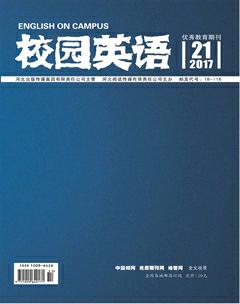Self—redemption in Desire—Analysis of Desire under the Elms
张静
【Abstract】Eugene ONeills plays are famous for reflecting the real life and full of philosophical meaning. His Desire under the Elms contains elements like infanticide, vengeance and incest. The story revolves around the right of inheritance of the Cabot farmhouse. None of them get the farm, but they find their self-redemption, their desire are fulfilled in another way.
【Key words】desire; self-redemption; tragedy
SYMBOLIC MEANING OF “ELM”
Some people suggest The two elm that ‘brood oppressively over the house are like the twisted love affair between Eben and Abbie, which seems to grow inevitably from the climate of frustration, envy, and antipathy in which the characters have to live. Considering the development of the play, we can regard elm as the symbol of mother. After being slaved to death, their influence upon the family lingers in the farmhouse, witnessing secret evil breed in desire, and to some extent their sinister maternity are incentive to tragic. On the negative side the mother archetype may connote anything secret, hidden, dark; the abyss, the world of the dead, anything that devours, seduces, and poisons, that is terrifying and inescapable like fate.(Zhu: 137) It only appears three times in the dialogue and respectively corresponding to the killing, seducement and incest.
DESIRE AND FULFILLMENT
Unlike his half-brothers, Ebens desire and hatred is much stronger because of sense of guilt for not protecting her mother. He denies his father and takes it the responsibility to defend the ownership of the house. When Eben find Minnie, the woman he like have an affair with his father, he rapes her angrily and proudly announce “She mayve been hisn—an yourn, too—but shes mine now!” his action may have dual implications. “From the time of puberty onward the human individual must devote himself to the great task of freeing himself from the parents; ...For a son, the task consists in releasing his libidinal desires from his mother, in order to employ them in the quest of an external love-object in reality...”(Zhu: 110) Obviously, Eben fails.
In The parlor, Abbie tries her best to play the role of mother, leads Eben release all his pent-up passion. She succeed. For Eben, she is the substitution of mother(Ill take yer Maws place), this is the revenge to father(Its her vengeance on him). There are good reasons for thinking that the “nature” we have mentioned is not simply the erotic feeling but also special feeling towards his mother. Being repressed and satisfied now.
The next day, Eben says “She kin sleep now”. When he meets his father, he says “Yew nme is quits. Lets shake hands”. This transformation means, with the help of Abbie, his libidinal have successfully releasing from his mother and in reconciling himself with his father.
CHARM AS TRAGEDY
As evil fruit of incestuous lust, the child alienates the family relationship, turn his parents into enemies. Abbie killed the boy to prove her love and it means she abandons the identification of mother. Her need for love is largely out weight than the need for kinship and desire for material. Eben chooses accept punishment with her. They all lose the farm, their real need are satisfied. The real desire of Eben is his Oedipus complex, and for Abbie is her neglected emotion. Just as most tragedies need a peaceful settlement, a process of atonement, their child sacrifice for their love, make them find salvation.
A striking feature of modern tragedy is to show how ordinary people understand existence of human beings. The inner tragedy of the civil life does not come from death but from life itself.(Peter: 24) In this play, pursuit of materialistic distorts the interpersonal relationship, only rely on love can they find salvation, even at the price of an innocent child.
As a modernized Greek tragedy, you can easily find some familiar plot or connect it with some Myth. Such as Medea, Oedipus, and the Eden Story. To some extent, the collective unconscious has played its role, which is the charm of the play.
References:
[1]Peter,Szondi.Modern drama theory(1880-1950).Trans.Wang Jian.Beijing:Beijing University Press,2006.
[2]Zhu,Gang.Twentieth Century Western Critical Theories.Shanghai:Shanghai Foreign Language Education Press,2005.

